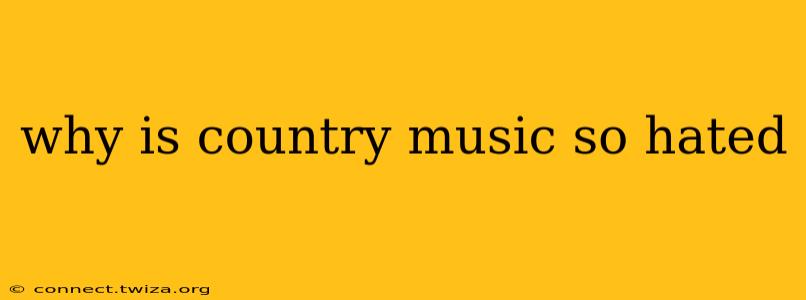Why Is Country Music So Hated? Deconstructing the Genre's Critics
Country music, a genre deeply rooted in American history and culture, enjoys immense popularity with a dedicated fanbase. However, it also faces significant criticism and even outright disdain from some listeners. Understanding this negativity requires exploring various facets of the genre, from its lyrical content and perceived clichés to its evolving sound and broader cultural context. Let's delve into the reasons why some people dislike country music.
What are the common criticisms of country music?
This is a multifaceted question. Many critiques stem from perceived limitations within the genre, while others relate to broader cultural shifts and generational differences. Common criticisms include:
-
Repetitive Themes and Lyrics: Critics often cite the repetitive nature of lyrical themes in country music. Songs frequently center around heartbreak, trucks, alcohol, and simple life narratives. While these themes resonate deeply with a significant portion of the audience, others find them predictable and uninspired, lacking artistic depth. The perceived overreliance on clichés can lead to a sense of stagnation and predictability.
-
Homogenization of Sound: Over time, some argue that country music has become overly homogenized, losing its regional diversity and unique sounds. The dominance of a specific "Nashville sound" often leads to a lack of variation and experimentation, alienating listeners seeking a broader range of musical styles within the genre.
-
Conservative Political Leanings: Country music is often associated with conservative political views, a perception reinforced by the artists who openly endorse these viewpoints. This political alignment can alienate listeners with differing political ideologies, creating a perceived barrier to entry for those who don’t share these beliefs.
-
Gender Roles and Stereotypes: Traditional country music, particularly older material, often portrays stereotypical gender roles, which can be problematic for modern audiences. The reinforcement of these societal norms can be a significant source of discomfort and criticism.
-
Lack of Innovation: Some listeners find country music lacks the innovation and artistic evolution present in other genres. The adherence to traditional structures and instrumentation can feel stale and unoriginal, particularly when compared to the constant evolution in genres like pop or hip-hop.
Is country music really that bad?
Whether country music is "bad" is entirely subjective. What one person finds enjoyable, another may find tedious. The genre's vast catalog encompasses a wide array of styles, artists, and lyrical content. Dismissing the entire genre based on personal preferences or exposure to a limited subset is overly simplistic. Many highly skilled musicians and songwriters contribute to country music, creating poignant and beautifully crafted works that connect deeply with their listeners. The criticisms leveled against the genre often reflect specific aspects of its presentation rather than a blanket condemnation of its artistic merit.
Why do some people love country music?
The enduring popularity of country music hinges on several factors:
-
Relatable Themes: The common themes of love, loss, heartbreak, and everyday life resonate deeply with listeners who find solace and comfort in hearing their own experiences reflected in the music.
-
Emotional Depth: Many country songs explore complex emotions with honesty and vulnerability. This emotional resonance can be a powerful draw for listeners seeking genuine connection.
-
Strong Storytelling: Country music often excels at storytelling, weaving captivating narratives through its songs. This narrative element can be exceptionally engaging for listeners.
-
Nostalgia and Tradition: For many, country music evokes a sense of nostalgia and tradition, connecting them to their heritage and cultural roots.
How has country music changed over time?
Country music has undergone significant evolution since its origins. From its early roots in folk, blues, and gospel to its incorporation of pop, rock, and even elements of other genres, it constantly adapts and transforms. These changes have both broadened its appeal and fueled criticism, as some fans lament the departure from traditional sounds while others embrace its evolving nature.
In conclusion, the criticisms leveled against country music often stem from its perceived limitations in lyrical creativity, sonic diversity, and adherence to traditional tropes. However, the genre's enduring popularity suggests that these criticisms do not negate its artistic value or its ability to resonate with a large audience. The ongoing evolution of country music suggests a dynamic future where the genre will continue to adapt and evolve, potentially addressing some of the criticisms while preserving its core essence.
